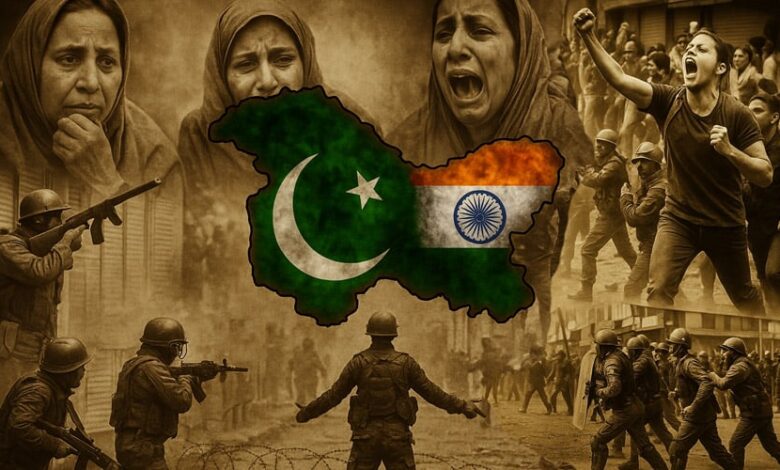The Kashmir dispute and the ‘trump’ card

Quaid-e-Azam Mohammad Ali Jinnah, the founding father of Pakistan, explicitly declared that Kashmir is the jugular vein of Pakistan. It is not a metaphor; it is a fact. Pakistan and Kashmir do not constitute two separate entities. They constitute a singular essence manifested in dual forms. Kashmir is integral to Pakistan, and vice versa – in political, geographical, and emotional contexts.
Seven decades have elapsed, during which three generations of Kashmiris have lived, struggled, and perished while cherishing the green flag. Their message is consistent: we seek admission to Pakistan. This is more than a mere slogan. They are engaged in a struggle for their right to self-determination—a principle codified in UN agreements yet persistently denied by India.
The pivotal moment occurred on August 5, 2019, when the BJP government led by Indian Prime Minister Narendra Modi revoked Kashmir’s special status. The action was unilateral and unconstitutional, promptly denounced by both Pakistan and the Kashmiri populace. Subsequently, the valley has transformed into a confined space resembling an open jail. Human rights abuses have surged, and demographic manipulation is in progress. India is importing individuals from outside Kashmir to alter the demographic equilibrium. It constitutes colonisation through alternative methods.
It is important to remember that India internationalised this problem by presenting it to the United Nations in 1948. The UN subsequently issued resolutions asserting that the future of Kashmir must be determined by its populace. A cessation of hostilities, military disengagement, and an unencumbered referendum. This constitutes the legal framework and represents the sole solution.
The twist has now arrived. Following the current military escalation between India and Pakistan, US President Donald Trump proposed to mediate. India requested a ceasefire. Trump intervened and garnered international attention with his statement. For Pakistan, this proposal for mediation represents a significant advantage – a diplomatic opportunity that should not be squandered.
Pakistan has consistently advocated for a peaceful resolution through dialogue. Nevertheless, India avoids discussion. They employ pretexts, procrastination strategies, and hostility to evade responsibility. Conversely, Pakistan has consistently endorsed Kashmiris through political, moral, and diplomatic means. Now is the moment to advance.
The administration is required to officially address Trump’s proposal. Not via clandestine routes, but by overt, formal diplomacy. We must submit a comprehensive dossier on Indian crimes to both the United States and the Secretary-General of the United Nations. The world requires the presentation of evidence, including names, dates, photos, and statistics.
Prime Minister Shehbaz Sharif has established a specialised group to advocate in Europe. Individuals such as Bilawal Bhutto Zardari, Sherry Rehman, Hina Rabbani Khar, Khurram Dastgir, Musadik Malik, Tehmina Janjua, Faisal Sabzwari, and Jalil Abbas Jilani constitute the committee’s membership. Nonetheless, this must not devolve into yet another series of symbolic gatherings and rhetoric. It must be proactive, focused, and unyielding.
President Trump, who has consistently asserted responsibility for the ceasefire and the avoidance of nuclear conflict, must acknowledge that this situation is merely transient. The unresolved Kashmir dispute perpetuates the persistent possibility of war.
Likewise, Pakistan must amplify its endeavours to emphasise the Kashmir problem on both domestic and international platforms. The Foreign Office must inform all ambassadors assigned to Pakistan of the matter. Parliament should be convened, and the chairman of the Kashmir Committee ought to unite all political parties, including the opposition, as the nation remains unified on issues of sovereignty, security, and the Kashmir cause, notwithstanding other divergences. This is not concerning political affiliations. This pertains to Pakistan. The national consensus is our greatest power; hence, when the world observes our oneness, it pays closer attention.
Only an assertive strategy and strong diplomatic initiatives over this subject will intensify pressure on India, compelling it to adopt a more defensive stance. Furthermore, the US president should be reminded of his statements, necessitating prompt and resolute action from Prime Minister Shehbaz Sharif. The United States must transcend a superficial commitment and apply genuine diplomatic pressure on Modi’s administration. President Trump, who has consistently asserted responsibility for the ceasefire and the avoidance of nuclear conflict, must acknowledge that this situation is merely transient. The unresolved Kashmir dispute perpetuates the persistent possibility of war.